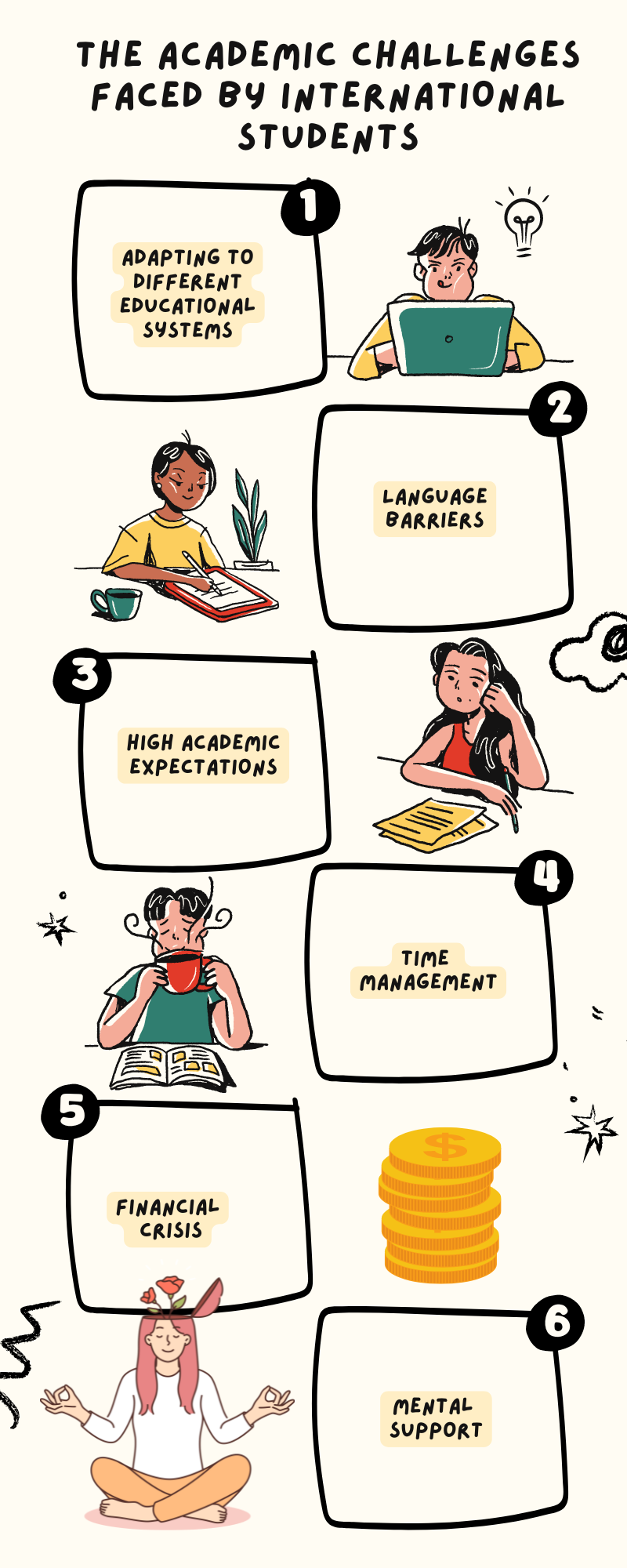Table of Contents
Students planning to study abroad often have a range of thoughts such as wondering what their academic life will be to questioning how they will handle new challenges. Despite these uncertainties and thoughts, studying abroad is still considered an exciting opportunity. It offers unique experiences, personal growth, cultural immersion, and academic achievement.
Some of the challenges that international students face are related to performance in coursework, language barriers, cultural differences, and homesickness while also striving to build a social life in a new country.
Successfully managing these challenges can lead to a fulfilling and holistic university experience, but failure can result in stress, isolation, and burnout.
In this blog by AllAssignmentHelp, we will explore international students’ challenges, the importance of balancing academics and social life, and strategies to achieve this balance.
Related: Real-Time Learning: A Great Revolution in Education
The Importance of Balance: Academics vs. Social Life
Every student wants to make a proper balance between academic and social life. This becomes critical, especially for students studying abroad. The pressure to succeed in academics is multiplied by high expectations from family and financial costs incurred in foreign countries for learning.
Failing to achieve this balance can have adverse effects. Overemphasizing academics at the expense of social engagement can lead to burnout, loneliness, and decreased mental health. On the other hand, focusing too much on social activities while neglecting studies can result in poor academic performance, which could negatively impact future career prospects.
To avoid such situations it is advisable to avail of online assignment help services. These services are designed to assist students with their academic stress of writing and help students have a proper balance between their academic and personal lives.
The Academic Challenges Faced by International Students

Adapting to Different Educational Systems
International students often come from different educational backgrounds. With varying learning experiences and exposure to different teaching styles, assessment methods, and grading systems they can’t adjust to new learning methodologies. This results in low academic grades and slow growth.
For example, some students may be familiar with a passive learning environment whereas others are used to active participation and debate.
Language Barriers
Language plays a significant role in academic growth. Non-native English speakers often face difficulty in coping with the current learning setup. Even students who are competent in English may struggle with academic writing, understanding complex lectures, or participating in discussions. This can add extra stress to the already demanding academic workload.
High Academic Expectations
International students often face immense pressure, both from their families and from within themselves. Many feel the burden to succeed to justify the time and money invested by their families. This pressure can sometimes lead to heightened anxiety, but it can also motivate students to push harder academically.
However, not every student experiences this situation in the same way. By working smart, students can turn these high expectations into achievements. There are several online platforms that offer academic assistance, making it easier to manage academic demands. A simple request like, can you take my class for me? can set the process in motion without any academic stress and you can pass with flying colours.
Time Management
Students in academics often struggle to make a proper balance between coursework, exams, and deadlines, but it can be significantly challenging for international students who are adjusting to a new culture and lifestyle.
Time management becomes critical, especially when students also need to maintain a social life, manage part-time jobs, or deal with administrative tasks related to their stay abroad.
Related: Time Management Definition-Let’s Learn This Amazing Art
The Social Challenges Faced by International Students
Cultural Differences
One of the most significant social challenges for international students is adapting to cultural differences. Every country has its unique customs, values, and social norms. For international students, this can be both exciting and overwhelming. They may experience culture shock, which can manifest as feelings of confusion, frustration, or isolation.
Building Friendships
Making friends in a new country is not always easy, especially if there are language barriers or cultural differences. International students may find it difficult to relate to domestic students or may feel excluded from social circles. They may also struggle to find people who share their interests or who understand their experiences as international students.
Homesickness and Loneliness
Being away from home for an extended period can lead to homesickness, especially if students have never lived abroad before. Missing family, friends, and familiar surroundings can be emotionally challenging, leading to feelings of loneliness and isolation. These feelings can be exacerbated by the difficulties of making new friends or integrating into a new social environment.
Financial Pressures
Many international students face financial pressures that can limit their ability to participate in social activities. The cost of studying abroad is often high, and students may feel the need to save money by working part-time jobs, which can leave them with little time or energy for socializing.
Strategies for Achieving Balance
Finding a balance between academics and social life is a process that requires planning, self-awareness, and flexibility.
Here are some strategies that can help international students achieve this balance:
1. Time Management: Prioritizing Tasks
Following effective time management strategies are the key to balancing academic responsibilities with social activities. Students should create a study schedule that allows them to stay on top of their coursework without sacrificing their social life. Prioritizing tasks based on deadlines and importance can help prevent procrastination and last-minute cramming.
One useful approach is the Eisenhower Matrix, which categorizes tasks into four quadrants based on urgency and importance:
- Urgent and important: Tasks that require immediate attention (e.g., assignments due soon).
- Important but not urgent: Tasks that contribute to long-term goals (e.g., reviewing class materials regularly).
- Urgent but not important: Tasks that are time-sensitive but may not contribute significantly to long-term success (e.g., answering non-essential emails).
- Not urgent and not important: Tasks that can be minimized or eliminated (e.g., excessive social media use).
Using this matrix can help students focus on what truly matters, allowing them to make time for both academics and social activities.
2. Setting Realistic Expectations
International students need to set realistic academic and social goals. While excelling in academics is important, students should not expect perfection in every assignment or exam. Setting attainable goals can reduce the pressure to perform flawlessly and allow more time for social activities.
In the same vein, students should manage their expectations for social life. It takes time to build meaningful relationships, and students should not feel discouraged if they do not immediately form a large circle of friends. Being open to different social experiences and gradually building connections is a more sustainable approach.
3. Combining Social Activities with Academics
One way to strike a balance between academics and social life is by combining the two whenever possible. For example, joining study groups can provide opportunities for both academic learning and social interaction. Many universities offer group projects, peer mentoring, and academic clubs that allow students to collaborate with others while staying focused on their studies.
International students can also explore extracurricular activities related to their field of study, such as academic societies, seminars, or workshops. These events provide a chance to network with like-minded individuals while expanding academic knowledge.
4. Leveraging University Support Services
Most universities have support services in place to help international students adjust to their new environment. These services may include academic advising, tutoring, career counseling, and language support. International student offices often organize cultural events, social outings, and orientation programs to help students make friends and feel more connected to the university community.
Taking advantage of these resources can help students manage both their academic and social lives. For example, language support services can help non-native speakers improve their communication skills, making it easier to participate in both academic discussions and social interactions. You can also get the benefits of external coursework writing services to cope up with your academic needs and strengthen your growth
5. Staying Connected with Home
Maintaining connections with family and friends back home can provide a sense of comfort and stability. While it is important for international students to immerse themselves in their new environment, staying in touch with loved ones through regular video calls, messages, or social media can help alleviate homesickness. This support system can also provide encouragement during challenging times, making it easier to cope with the stresses of academics and social life.
6. Exploring the Host Country’s Culture
Immersing oneself in the host country’s culture can help international students feel more integrated and comfortable in their new surroundings. Exploring local traditions, festivals, and cuisine can be a fun way to meet new people and make the most of the study abroad experience. Students can also participate in cultural exchange programs or international student organizations, which often organize events designed to bring together students from different backgrounds.
By engaging with the local culture, international students can broaden their perspectives and gain a deeper appreciation for their host country, making the overall experience more rewarding.
7. Mindfulness and Self-Care
Balancing academics and social life requires maintaining mental and emotional well-being. Practicing mindfulness and self-care can help students manage stress and stay focused. Techniques such as meditation, yoga, and journaling can reduce anxiety and improve concentration. Regular physical activity, healthy eating, and adequate sleep are also crucial for maintaining energy levels and a positive mindset.
International students should also be mindful of their mental health and seek professional help if they are struggling with anxiety, depression, or homesickness. Universities often provide counseling services specifically tailored to the needs of international students.
Also Read: Strategies to Perform Well in Your Online Mock Tests
Conclusion
Balancing academics and social life is a challenge for all students, but it is particularly significant for international students who are adjusting to a new culture and environment. By managing their time effectively, setting realistic goals, leveraging university resources, and engaging with both academic and social opportunities, international students can achieve a fulfilling and well-rounded experience abroad.
The key is finding a balance that allows for academic success while also prioritizing personal well-being and social connections. When international students strike this balance, they are not only more likely to succeed academically but also to enjoy their time abroad, forming lasting friendships and memories that will stay with them long after their studies are complete. To achieve this balance, getting coursework help from a reliable service provider is one such option that allows you to have better learning and growth.
FAQs
1. What are the key challenges international students face when balancing academics and social life?
Common challenges include adjusting to a new education system, language barriers, and cultural differences while managing academic pressure and social expectations.
2. How can international students manage their time effectively between studies and social life?
Time management tools like creating a study plan, prioritizing tasks, and setting boundaries for social activities help maintain balance.
3. Does socializing impact academic performance for international students?
Yes, a strong social network improves mental health, which can enhance focus and academic success.
4. What can international students do to build a social life while managing homesickness?
Joining campus clubs, connecting with fellow students, and staying in touch with family can ease homesickness and foster friendships.
5. How can universities help international students balance academic and social pressures?
Universities can provide counselling, peer support, and cultural integration programs to help students adapt and succeed.
